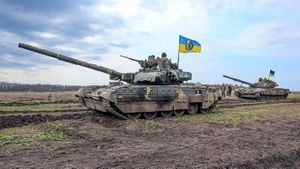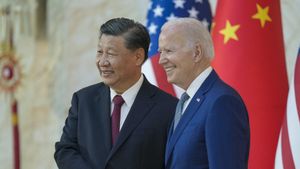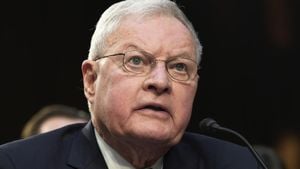A hard-right critic of NATO is poised to contest Romania's presidential election runoff after securing a surprising lead during the first round of voting. Calin Georgescu, who ran as an independent candidate, captured approximately 22.95% of the votes, leaving behind Elena Lasconi, the leader of the opposition Save Romania Union, who garnered around 19.2%. Meanwhile, the pre-vote favorite Prime Minister Marcel Ciolacu finished third, marking a dramatic shift away from the anticipated results based on pre-election polling.
With the country gearing up for the decisive runoff scheduled for December 8, the unexpected results raised eyebrows among political analysts and observers alike. The elections serve as a litmus test not only for Romania's domestic policies but also for its foreign relations, particularly considering the nation's commitment to NATO and its role within the European Union.
Georgescu's campaign gained momentum through unconventional methods, leveraging social media platforms such as TikTok to reach disillusioned voters frustrated by the existing political establishment. His platform criticized NATO’s effectiveness and questioned the alliance’s guarantees of protection for member countries, particularly amid rising tensions with Russia. “I have voted for the wronged, the humiliated, those who feel they do not matter in this world,” Georgescu declared on election night, presenting himself as the voice of the disenfranchised.
This election, characterized by its focus on the soaring cost of living and socio-economic disparities, reflected the electorate’s anxiety. Romania has one of the highest percentages of its population at risk of poverty across the EU, which has fueled support for candidates promising significant changes. Political scientist Cristian Pirvulescu pointed out the potential ramifications of Georgescu's ascent, noting, “Just think, we are potentially facing the situation of having a far-right president.”
The results were particularly shocking since Ciolacu was previously projected to win approximately 25% of the vote. Instead, his disappointing outcome raises questions about the future of Romania’s social democratic policies, especially as the nation approaches parliamentary elections. The surprising results have sent shockwaves through Romanian financial markets as Romania’s euro bonds decreased by nearly 2 cents following the first round.
Meanwhile, Lasconi, a former journalist, has positioned herself as the center-right alternative and emphasizes combating corruption and fostering transparency as key components of her campaign. She advocates for increased defense spending and continued support for Ukraine amid the Russian territorial aggression. Romania's Black Sea ports play a pivotal role by facilitating the export of Ukrainian grain, which remains critically important as the region grapples with these geopolitical challenges.
The Romanian presidency is primarily symbolic yet holds significant sway over defense matters, which adds weight to the upcoming election outcome. With NATO's influence growing following the invasion of Ukraine, and as pressures mount for Romania to bolster defense capabilities, the nature of its leadership is more consequential than ever. Regardless, the electorate's shift suggests growing sentiments of disillusionment with the traditional political spectrum.
Election watchers remain cautious yet intrigued about how alliances will reshape following the election. The possibilities of Georgescu's presidency may suggest noteworthy changes to Romania’s foreign policy orientation, particularly with respect to NATO and its relations with neighboring Ukraine. Observers note, "Never have we seen such a surge compared to surveys during our 34 years of democracy.”
Georgescu, who formerly belonged to the far-right Alliance for Uniting Romanians party, positions himself as vehemently opposed to NATO military strategies, labeling the alliance's missile defense site as “a shame of diplomacy.” These comments resonate with voters eager for alternatives to the current status quo.
Although the political forecast appears uncertain, the upcoming runoff presents significant possibilities for reshaping Romania's political direction. With tensions high, all eyes remain on the balloting this December, where the winner will determine not only Romania's leadership but also its stance on international issues including NATO alignment and regional security dynamics.



